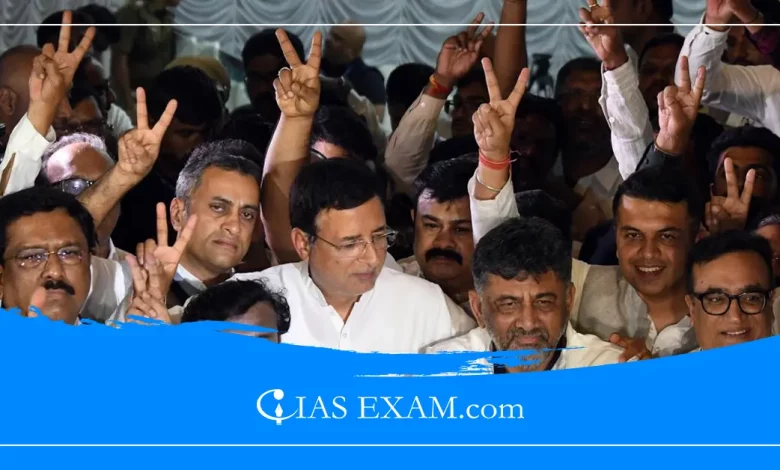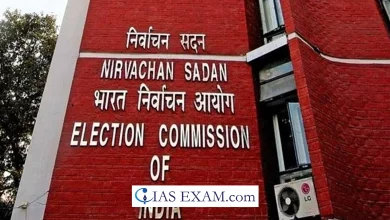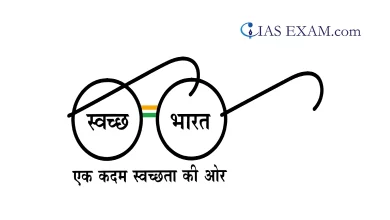Cross-Voting in Rajya Sabha and its Implications
GS Paper 2 - Indian Constitution, Parliament

Context
Recent Rajya Sabha elections in Uttar Pradesh, Himachal Pradesh, and Karnataka have been marred by instances of cross-voting, prompting concerns over the integrity of the electoral process. Understanding the legal framework governing Rajya Sabha elections and the implications of cross-voting is crucial in addressing these concerns and upholding democratic principles. Cross-voting, a phenomenon where legislators cast their votes against party lines, challenges the integrity of the electoral process and raises questions about political ethics and democratic principles.
Provisions related to RS Elections and Cross-Voting
- Constitutional Provision: Article 80 of the Constitution mandates the indirect election of Rajya Sabha representatives by the elected members of State Legislative Assemblies.
- Historical Context: Rajya Sabha elections were traditionally uncontested until 1998, when cross-voting in Maharashtra marked a departure from this trend.
- Open Ballot System: An amendment to the Representation of the People Act, 1951 in 2003 introduced open ballot voting for Rajya Sabha elections, aimed at curbing cross-voting.
- Tenth Schedule (Anti-Defection Law): Introduced in 1985, this Schedule disqualifies legislators who voluntarily give up party membership or vote against party instructions. However, it does not apply to Rajya Sabha elections.
- Court Rulings: The Supreme Court, in cases such as Kuldip Nayar versus Union of India (2006), upheld the open ballot system while clarifying that voting against party candidates in Rajya Sabha elections does not invoke disqualification under the Tenth Schedule.
Challenges associated with Cross-Voting
- Undermining Party Discipline: Cross-voting undermines the discipline within political parties. It signifies a breach of trust between party leadership and elected representatives, leading to fragmentation and instability within political organizations.
- Erosion of Electoral Mandate: Cross-voting distorts the electoral mandate and undermines the democratic principles of representation. Elected representatives are expected to reflect the collective will of the electorate, and cross-voting dilutes this mandate, leading to a disconnect between voters and their representatives.
- Manipulation and External Influence: Instances of cross-voting often raise concerns about external influence and manipulation in the electoral process. Factors such as inducements, coercion, or pressure from vested interests can compromise the autonomy and independence of elected representatives, subverting the democratic process.
- Loss of Public Trust: Cross-voting erodes public trust in the political system and democratic institutions. When elected representatives prioritize personal interests or external pressures over the public good, it undermines the credibility of elected bodies and diminishes public confidence in the democratic process.
- Challenges to Legislative Functioning: Cross-voting can lead to instability and unpredictability in legislative functioning. It disrupts the smooth conduct of parliamentary proceedings and compromises the ability of legislative bodies to enact meaningful legislation and address pressing issues facing the nation.
- Ethical and Moral Dilemmas: Cross-voting raises ethical and moral dilemmas for elected representatives. It forces them to confront conflicting loyalties between party allegiance, personal convictions, and the interests of their constituents, often resulting in ethical compromises and moral quandaries.
- Legal and Constitutional Implications: Cross-voting may have legal and constitutional implications, especially if it violates party rules or electoral laws. While the Constitution guarantees freedom of conscience to elected representatives, it also imposes responsibilities and obligations to uphold the democratic principles enshrined in the constitutional framework.
Way Forward
- Upholding the Intent: Instances of cross-voting undermine the transparency aimed at by the open ballot system, raising questions about the effectiveness of existing mechanisms.
- Judicial Intervention: The Supreme Court’s commitment to safeguarding democracy provides hope for addressing cross-voting issues through suo moto Public Interest Litigation or appeals against disqualification rulings.
- Revisiting Precedents: There is scope for the court to reinterpret its previous rulings in light of evolving circumstances, potentially aligning the consequences of cross-voting with the principles of the Tenth Schedule.
- Deterrent Measures: Clarifying that cross-voting may constitute grounds for disqualification under the Tenth Schedule could serve as a deterrent against future instances.
Conclusion
The phenomenon of cross-voting in Rajya Sabha elections undermines the fundamental principles of democracy and poses a threat to the integrity of the electoral process. Addressing this challenge requires concerted efforts from political parties, electoral authorities, and civil society to uphold transparency, accountability, and democratic norms. By reinforcing party discipline, enhancing transparency, implementing electoral reforms, and promoting public awareness, India can safeguard the sanctity of its democratic institutions and ensure free and fair elections in the Rajya Sabha and beyond.
SOURCE: The Hindu





.png)



